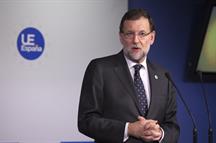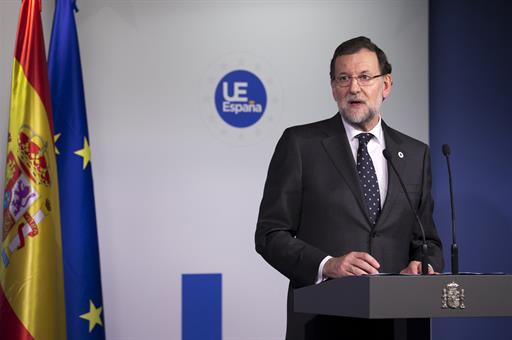Mariano Rajoy highlights European Council backing for "Juncker Investment Plan"
President's News - 2014.12.18
Brussels (Belgium)
Mariano Rajoy explained that a European Strategic Investment Fund will be created and given 21 billion euros of public money: 16 billion from the EU budget and 5 billion from the European Investment Bank. The goal of this plan is two-fold: "to strengthen the ability of the European Investment Bank to assume risks; and to mobilise essentially private investments".
The President of the Government explained that the fund will comprise two parts. The first will consist of infrastructure projects of European importance, mainly digital and energy networks, although others will also be included, such as transport, education, research and development, renewable energies and energy efficiency. In this regard, "support for the Juncker Plan will come via risk coverage or capital provisions", in other words, "there will be no direct public financing" but rather the projects will need to demonstrate "a sufficient return and meaningful participation from the private sector" to become eligible for selection. Mariano Rajoy said "this is not about increasing existing Structural Funds but rather about finding cheaper sources of funding".
"The other component of the fund", added Mariano Rajoy, "is the financing of risks for SMEs and mid-cap companies, which constitute the backbone of our business fabric and are the main creators of new jobs". The President of the Government recalled that "job creation is a major priority for the Government of Spain".
These investments would arrive by mid-2015
Mariano Rajoy also said that the European Council provided the Commission with a mandate to present a regulation proposal in January. The goal is to reach an agreement with the European Parliament and the Council before June "so that the investments can be mobilised by mid-2015". The President of the Government explained that "this regulation will establish the selection criteria to be applied to the projects, in other words, how the fund will be governed".
 Consejo EuropeoMariano Rajoy believes that the "Juncker Plan" is an essential step in "achieving progress on creating the internal market" and ending the physical barriers that prevent its full operation. Energy connections - electricity connections especially - are a perfect example of this. In this regard, Mariano Rajoy emphasised the importance of the meeting he attended with the President of France, the Prime Minister of Portugal and Jean-Claude Juncker before the European Council to take steps along this path. The three leaders agreed to meet again in Spain in February.
Consejo EuropeoMariano Rajoy believes that the "Juncker Plan" is an essential step in "achieving progress on creating the internal market" and ending the physical barriers that prevent its full operation. Energy connections - electricity connections especially - are a perfect example of this. In this regard, Mariano Rajoy emphasised the importance of the meeting he attended with the President of France, the Prime Minister of Portugal and Jean-Claude Juncker before the European Council to take steps along this path. The three leaders agreed to meet again in Spain in February.
The fight against tax fraud and the treaty with the United States
Under an initiative from Spain, the European Council also introduced a paragraph on tax evasion and fraud. Mariano Rajoy explained that "we must promote measures aimed at combating the erosion of tax bases at multinational companies and the artificial transfer of corporate profits from one country to another". The goal is "to move towards increased transparency in fiscal practices and further develop the exchange of fiscal information" because "only decisive joint action by the European Union will be able to combat these practices".
Mariano Rajoy also announced that an informal Council meeting has been called for February in order to maintain progress on the Economic and Monetary Union, an issue that the Government of Spain believes to be highly important and on which it has been working for the last three years. The President of the Government also expressed his full backing for the "ambitious" treaty being negotiated between the EU and the United States, which will bring about a "strengthening of the multilateral trade system".
Ukraine and the new relations between Cuba and the US
The current situation in Ukraine was another topic on the agenda for the European Council. According to the President of the Government, EU countries will continue to offer their support to Ukraine and its legitimate government resulting from the elections, but "urgent reforms must be implemented so that the country can move forward and our help can be made effective". Nonetheless, Mariano Rajoy recognised that "the situation in eastern Ukraine is still an issue of concern", although there are signs that "the situation on the ground has improved in recent days".
Furthermore, the Heads of State and Government highlighted "the historic importance" of the news on the re-establishment of diplomatic relations between Cuba and the United States. Mariano Rajoy said that the European Council underlined "the hopeful nature of the new situation", while saying that "the future for the people of Cuba will be built on the basis of democracy and human rights".
2014, a positive year for the EU
Mariano Rajoy stressed that "we are reaching the end of a positive year for Europe". In this regard, he highlighted some of the areas in which the EU has made progress. Firstly, Spain, Portugal and Ireland successfully concluded their financial assistance programmes. In Spain, he added, this process focused on the banking sector alone and "we have already started to make repayments". Furthermore, Spain has met its objectives under the excessive deficit procedure and is no longer considered to be a country with excessive macroeconomic imbalances, something that has also been recognised by the European institutions. Mariano Rajoy went on to say that "the Spanish banking system has successfully passed the stress tests and quality review of its assets by the European Central Bank and the European Banking Authority".
Finally, the President of the Government spoke about the "common and ambitious position" adopted by the European Council in terms of climate change, a position that will be reflected at the upcoming Paris Summit.





